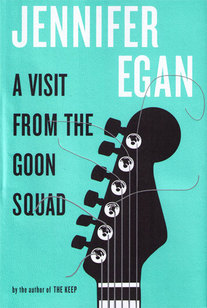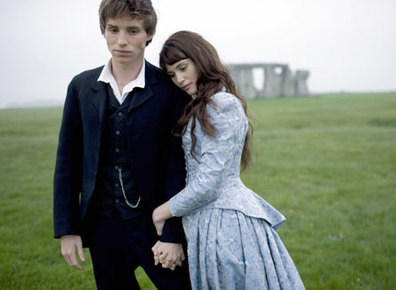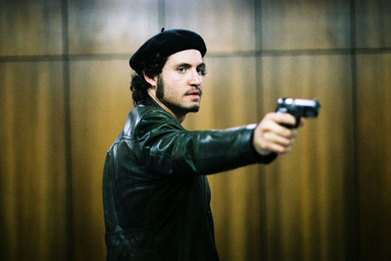 Often, as I enter the final pages of a book I love, I begin to mourn its end. So it was with Jennifer Egan's novel, A Visit From the Goon Squad, which I just finished. And it's actually sort of fitting I felt this way, because this is a novel about the passage of time -- and the gnawing anxiety that time's passage means it one day has to end. I didn't know much about this book before I started it. I knew that it had just won the National Book Critics Circle Award, that my friend Marcela (who never steers me wrong) had loved it, and that rock music was a central theme. Somehow, despite my failures at music coolness, this was enough to get me to buy it and dive in, and I'm so glad it was. Egan, who I'd only encountered in short fiction here and there, is a relentlessly hip and intellectual writer with deep sense of life's pains and an even deeper sympathy for her characters. This sensibility carries her through a layered narrative and more than makes up for the few missteps she inevitably makes along the way. (Hey, novels are messy, okay?) Goon Squad can't be said to move in any one direction, instead spanning forward and backward over decades, characters, and locales. (New York City, Naples, Kenya, San Francisco...) At the center of it all is Bennie Salazar, a rock producer at the height of his powers in the late 1990's and early 2000's, and his assistant, Sasha, a beguiling redhead and kleptomaniac who keeps Bennie going. A different character anchors each of the book's thirteen chapters, so that the novel could be said to be a collection of connected stories, except that the stories are so masterfully connected and the themes they cover so epic that "novel" seems the only proper term. Certainly, Goon Squad makes a reader think -- but as pure entertainment, it's also completely riveting. Whether I was dipping back several decades or plunging ahead, I read in a constant state of suspense -- for more information about the people I had met, and yes, for some further sense of what would happen to them “next.” Large gaps in people's lives are masterfully deployed, as we join many of the characters in wondering how on earth they got "from A to B." From skinny, spastic guitar hero to obese has-been with cancer. From hot young thing in Manhattan to mother of two in the California desert. This is purely brilliant in a book about time and the mysteries of change. Always, I wanted to rush forward to find out, but I also wanted to prolong the reading process as long as possible to preserve the captivating experience of the book. To live in its moment, and be young with it, before it got away. [BONUS MATERIAL: On her website, Egan talks about the inspiration and writing process for each section. Just click on the time and place for a look behind the scenes -- after you've read the book, of course.]
5 Comments
This week, on the Colorado Review blog, the lovely Lauren Gullion asks me some questions about writing.
Meanwhile, helpful husband and Victorian novel evangelist wants to know why I didn't mention Thomas Hardy, so I'm mentioning him now. Yes, it's true. The great man of Wessex has taught me much about doomed love and landscapes... Because I always need one more thing to do, I've recently become an assistant editor at Barrelhouse, the awesome DC-based journal of fiction, poetry, pop flotsam, and cultural jetsam. This means I get to bring my spidey-sense to the great adventure that is the submissions queue. As a submitter of fiction myself, I have to say I'm really appreciating the role reversal. But don't worry, fellow writers, I know: with great power comes great responsibility.
Finally saw Olivier Assayas's five-and-a-half hour Carlos, a researched but fictionalized account of the life and deeds of Carlos the Jackal. While I enjoyed the mini-series quality of watching it on three different nights, each time looking forward to the next, I have to admit I found the film just a wee bit overhyped.
The eminent Kirk Michael gives a lovely defense in his best of 2010 round-up -- and he's right that Edgar Ramirez is dazzling to watch -- but in the end I think I like what Kirk says about the movie better than what the movie says about the movie. There were just too many stock speeches about this or that terrorist's commitment to the internationalist revolution and too many procedural scenes that felt taken straight from witness testimony. The film does offer an interesting look at the geopolitics of the 1970s and the ways in which governments and terrorists interacted. And you definitely feel the shift in global ideology as Carlos finds himself cast out of Europe -- in the end only Sudan will have him -- becoming ever more the pampered fat cat he supposedly abhors. But for all the lingering of Assayas's camera on Ramirez's naked frame (and a fine frame it is -- at least initially), the film rarely lingers on the man behind the passion. While it's true that extremists might not have much use for introspection, cinema certainly does, and it was a shame not to get more of it here -- or at some acknowledgment of its frustrating absence. |
Aboutauthor of The Violet Hour, reader, prodigious eater of ice cream Archives
June 2014
Categories
All
|


 RSS Feed
RSS Feed